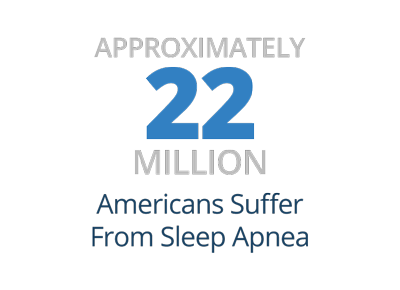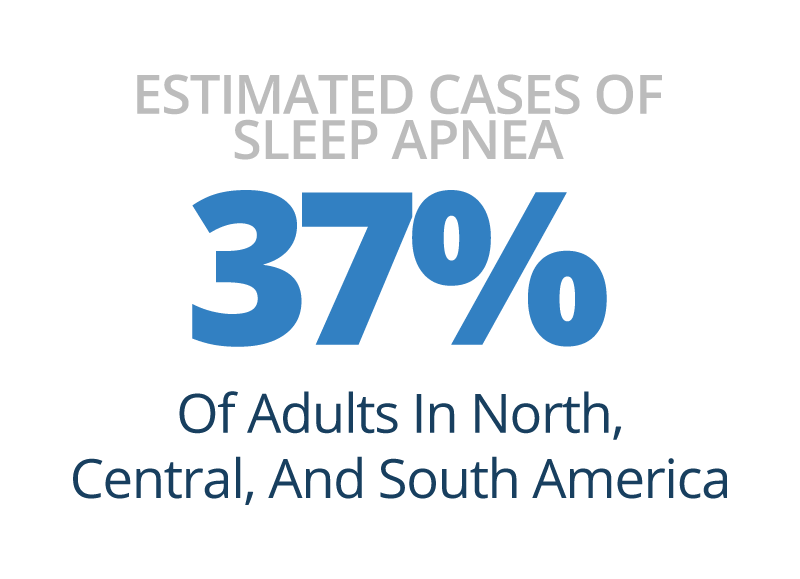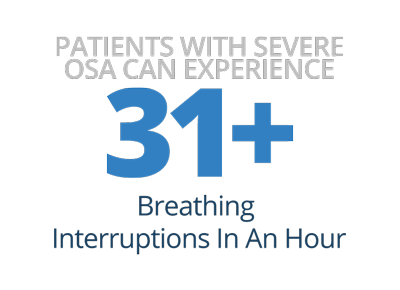Can Sleep Apnea Cause Death?
Over the years, there’s been a debate on whether sleep apnea causes death or not. In short, although sleep apnea itself will not kill you, the complications it causes certainly can. Here, we’ll answer the most frequently asked questions about sleep apnea and death.
How Many People Suffer From Sleep Apnea?
According to the American Sleep Apnea Association, approximately 22 million Americans suffer from sleep apnea. But it’s also estimated there are millions of others who are undiagnosed.
Recently, in a review of epidemiological studies presented at Sleep 2019, the Annual Meeting of Associated Professional Sleep Societies indicated the number could be as high as 37% of adults in North, Central and South America who suffer from sleep apnea.
That’s an estimated 54 million American adults with obstructive sleep apnea. This is a significantly higher estimate than the 22 million often cited which is based on a 2013 study. You can read more about this recent study here.
Out of these reported numbers of people affected, Obstructive Sleep Apnea (OSA) is the most common type and is classified from mild to severe. Patients with severe OSA can experience 31+ breathing interruptions in an hour; these disruptions occur as a result of a blockage in the airway and causes stress to the cardiovascular system.



The greater risk for heart health issues as a result of untreated sleep apnea is one of the factors contributing to sudden cardiac death.
How Many People Die From Sleep Apnea?
Statistics on sleep apnea show an estimated 38,000 people die annually as a result of cardiovascular events linked to sleep apnea. 1 Without proper treatment, sleep apnea sufferers are 3.8 times more likely to face premature death than the rest of the population.2 This is in part because sleep apnea can cause or worsen medical conditions such as stroke, coronary artery disease, and type 2 diabetes.
Although sleep apnea is rarely recognized as a contributing factor in death, actress Carrie Fisher, famous for her role as Princess Leia in the “Star Wars” series, brought much-needed attention to the increased death risk associated with sleep apnea.
Fisher died in 2016, just four days after a cardiac event. The medical examiners concluded that “sleep apnea and other undetermined factors” contributed to her death. Fisher was 60 years old. She was just one of several famous people where sleep apnea was a contributing factor in their death.
Other famous people whose deaths have been connected to sleep apnea are:
- The comedic actor John Candy
- James Gandolfini from “The Sopranos”
- Justing Tennison from “Deadliest Catch”
- Jerry Garcia from Grateful Dead
- The NFL player Reggie White
- President William Howard Taft; among others
Does Sleep Apnea Shorten Your Lifespan?
According to research, sleep apnea does shorten lifespan. The largest study to date is the Wisconsin Sleep Cohort Study. This study is a well known community based epidemiology study investigating sleep apnea. The study began in 1989, where 1,522 Wisconsin state employees were randomly tested with polysomnography (a test to identify sleep apnea).
Terry Young, PhD, and University of Wisconsin-Madison epidemiologist was the principal investigator of the study. He reported from their findings that people with severe sleep apnea have a much higher mortality risk than people without sleep apnea. This risk of death or dying suddenly increases when sleep apnea goes untreated.
More specifically, the study showed that 63 people (4% of the group) had severe sleep apnea, 20% had mild or moderate sleep apnea, and 76% didn’t have sleep apnea. A follow-up study was performed in 2008. In the follow-up study, researchers examined state death records.
In the March 2008 follow-up study, based on initial results, it was found that 19% of the participants with severe sleep apnea died (12 deaths), compared to only 4% of participants with no sleep apnea. 42% of the deaths associated with severe sleep apnea were attributed to stroke or cardiovascular disease. The severe sleep apnea study participants experienced a five times higher mortality risk of cardiovascular death than people with mild sleep apnea.
It’s important to mention that most of the participants in the testing were unaware they had a sleep disorder. After the diagnosis, the researchers at The University of Wisconsin contacted the participants with severe sleep apnea, explained the health risks and health problems associated with the condition, and advised them to see a doctor.
Do You Have These Common Risk Factors Of Sleep Apnea?
Take this quick quiz to see if you have a low, medium or high risk sleep apnea profile. Easy, Fast, Secure.
Why Sleep Apnea Shouldn’t Be Left Untreated
OSA affects 1 in 3 adults in the United States, and the estimated rate is closer to 1 in 2 in the Southeast, where obesity rates are highest. 3 Half of those patients have moderate or severe OSA in which untreated, the death rate approaches 40% over 12-15 years.4
Here are a few of the more common medical conditions and health issues that are linked to untreated sleep apnea and the resulting life-shortening consequences:
Diabetes
Sleep apnea is closely associated with prediabetes and type 2 diabetes, as it alters glucose metabolism and can promote insulin resistance. People with an existing diabetes condition can also have a harder time maintaining an average glucose level.
One study found over 86% of obese patients with type 2 diabetes, especially among individuals with a higher waist circumference and BMI, have obstructive sleep apnea. 5
High Blood Pressure
Hypertension, or what is commonly referred to as high blood pressure, is one of the most common health concerns in the United States, with more than 100 million American adults suffering from it. 6
Hypertension is linked to heart disease, heart failure and stroke, in addition to health conditions such as OSA. Research indicates up to 50% of people suffering from hypertension also have sleep apnea.
The sudden drop of oxygen in the blood during sleep apnea episodes is one reason sleep apnea and high blood pressure are so closely connected.
Another more powerful reason is that when your blocked airway restricts how much oxygen enters the body, the body must find a way to open up the blocked pathway. It does this by releasing norepinephrine (adrenaline). The increase of norepinephrine (norepi) arouses the brain to signal the throat to open.
The arousals aren’t typically enough to fully wake someone, and this cycle repeats itself throughout the night. Spikes in norepinephrine, however, don’t only arouse the brain. They also raise blood pressure. This means for many, adrenaline is pumping through the body all night long and creating continuous spikes in blood pressure.
If you have a pre-existing condition, all night long your body needs to release the very thing that keeps your blood pressure high in order to breathe. For this reason, like diabetes, OSA makes it more challenging to keep the blood pressure under control without proper treatment.
Heart Disease
Heart attacks, blood clots in the legs, and strokes are more likely to occur when suffering from sleep apnea.
The risk increases with the severity of OSA. Studies show that the risk of heart failure can increase by 140%, and coronary heart disease by 30%. If you have undiagnosed or untreated sleep apnea, you have a 60% increased risk of stroke.7
Other Complications
There are numerous other health conditions that are either worsened by or contribute to obstructive sleep apnea. The constant breathing interruptions cause fatigue, weight gain, impotence, memory problems, headaches, and may lead to falling asleep while driving, among others.
Seek Treatment For Sleep Apnea Today
If you have any of the conditions mentioned above, are not sleeping well, snore or stop breathing at night, you might be suffering from sleep apnea. Don’t wait for other health complications to start appearing before contacting a sleep medicine professional for diagnosis and treatment.
If you’re at risk, don’t delay getting evaluated. Why put off diagnosis and treatment that makes you feel better each day and may extend your life?
At Sleep Centers of Middle Tennessee, we perform sleep studies every day, with an average of 5,000 in lab sleep studies per year. We are sleep experts; we’ll help you feel rested and reduce the health risks from sleep apnea.
- https://www.ncbi.nlm.nih.gov/pmc/articles/PMC4234108
- https://journals.plos.org/plosmedicine/article?id=10.1371/journal.pmed.0010062#:~:text=The%20Wisconsin%20Sleep%20Cohort%20Study%20is%20an%20ongoing,on%20sleep%20habits%2C%20health%2C%20and%20demographics%20in%201989.
- https://sleepmeeting.org/wp-content/uploads/2019/04/SLEEP_42_S1-Website-Final.pdf
- https://pubmed.ncbi.nlm.nih.gov/8464434/
- https://www.ncbi.nlm.nih.gov/pmc/articles/PMC2681024/
- https://www.cdc.gov/bloodpressure/facts.htm
- https://www.ncbi.nlm.nih.gov/pmc/articles/PMC4883191/
